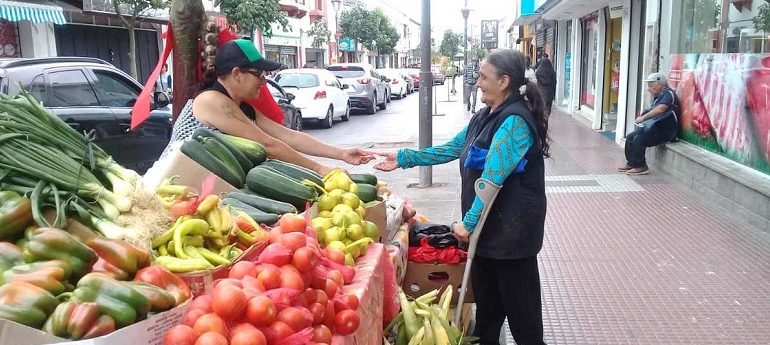
Two Special Rapporteurs from the Human Rights Council challenged the Chilean government on the subject of the human rights violations raised by the “Red de defensa de los territorios Araucanía” and CETIM.
The questions focused on the criminalisation and ill-treatment of female street vendors, especially those from the Mapuche communities in the town of Temuco in the Araucania region of Chile as well as Chilean and migrant street vendors.
The UN Special Rapporteurs on extreme poverty and on the rights of indigenous people, who were behind the interpellation, underscored the importance of informal commerce for rural people and stated that it was an ancestral tradition for those living in extreme poverty. The Rapporteurs recalled that Chile must, in line with ILO Convention 169 on indigenous peoples and tribes, acknowledge the importance of cultural activities in indigenous communities to ensure their self-sufficiency and economic development.
Furthermore, the Rapporteurs underlined that informal commerce is legal, given that the Chilean Constitution guarantees the freedom to pursue an economic activity as long as it does not run contrary to morality, public order or national security and that it does not break the law. However, the regulation of it is the remit of Chilean municipalities which can regulate activities by decree. On this basis, the town of Temuco issued decree no. 3 in 2018 to ban street commerce in the town centre, which was applied by the police force. The Rapporteurs regret that, in the process, vendors were subjected to ongoing violence and repression as well as cruel, inhumane and degrading treatment at the hands of municipal inspectors.
The violations invoked concern the right to life, to physical integrity, to freedom and safety as well as the right to work, preventing people from carrying out activities to cover their needs, which compounds their poverty and vulnerability.
The Rapporteurs also stated that the decree issued by the municipality of Temuco directly affects the rights of indigenous peoples, without their prior consultation. The UN experts concluded with a series of eight questions addressed to the Chilean government to clarify the situation. There was also an annex recalling the relevant international human rights instruments, which Chile has to uphold.
Response from the government and municipality of Temuco
On 28th July 2021, two months after the appeal of the Rapporteurs, Chile only partially replied to the questions regarding the measures put in place to guarantee the respect of physical and mental integrity, to freedom and safety as well as the street vendors’ right to work. The response thus ignores five out of the eight questions asked by the Special Rapporteurs.
The “Red de defensa de los territorios” and CETIM are pleased that the UN Rapporteurs pointed out that the bans on street commerce are incompatible with international frameworks on human and labour rights.
Furthermore, this case demonstrates the role that UN human rights mechanisms (UN Special Rapporteurs in this case) can play to rectify illegal situations on a local or national level. These mechanisms need to be appropriated and used in the perspective of grassroots social demands.
Decree no.3 in Temuco should therefore be repealed to make way for a new local regulation which fully involves street vendors and guarantees the application of labour law as well as the participation and physical and psychological integrity of all the people in the town including street vendors.
It is now the duty of competent authorities to rectify this situation which breaches the human rights of the most vulnerable people in the country, in line with the observations of the Special Rapporteurs.
The “Red de defensa de los territorios de la Araucanía” and CETIM will remain committed to defending the rights of street vendors in Temuco, and will continue striving (on a local, national and international level) to protect their rights and ancestral traditions to allow them to escape famine. In this regard, and given the incomplete response from the Chilean authorities, the two organisations will continue to advocate for the repeal of both the decree and regulation on street commerce to protect the rights of the people concerned.
Report presented to the UN Rapporteurs by CETIM and the Red de defensa de los territorios (in Spanish)